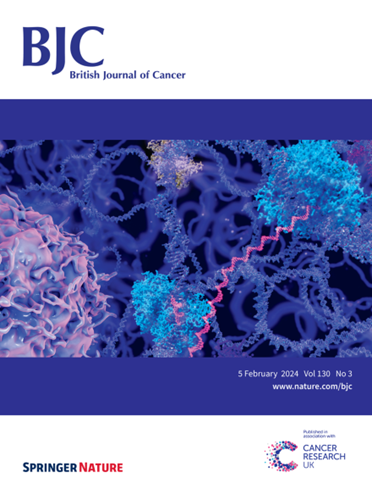Dietary intake of isoflavones and coumestrol and risk of pancreatic cancer in the prostate, lung, colorectal, and ovarian cancer screening trial
IF 6.4
1区 医学
Q1 ONCOLOGY
引用次数: 0
Abstract
Although phytoestrogens modulated pancreatic tumour growth in experimental studies, it remains unclear whether phytoestrogen intake is associated with pancreatic cancer. Of 92,278 persons who completed the Diet History Questionnaire in the Prostate, Lung, Colorectal, and Ovarian Cancer Screening Trial, 346 were diagnosed with pancreatic cancer within a median follow-up of 9.4 years. Cox proportional hazards regression was used to evaluate pancreatic cancer risk in relation to phytoestrogen intake. After adjustment for confounders, intakes of glycitein and formononetin were associated with a reduced risk of pancreatic cancer [highest vs. lowest quartile, hazard ratio (HR) (95% confidence interval (CI)) for glycitein: 0.60 (0.39, 0.92); P for linear trend: 0.01; HR for formononetin: 0.51 (0.37, 0.70); P for linear trend: 0.005]. These associations were stronger and their linear trends across the quartiles of intakes were more statistically significant among ever smokers than never-smokers. A reduced risk was also observed for ever smokers in the highest quartile of total isoflavones or daidzein compared with those in the lowest quartile. Our study suggests that high intakes of total isoflavones and some individual isoflavones were inversely associated with pancreatic cancer risk, but this potential protective effect was confined to ever smokers.在前列腺癌、肺癌、结直肠癌和卵巢癌筛查试验中,膳食摄入异黄酮和库米雌醇与胰腺癌风险的关系。
背景:虽然在实验研究中植物雌激素调节胰腺肿瘤生长,但植物雌激素摄入是否与胰腺癌相关尚不清楚。方法:在前列腺癌、肺癌、结直肠癌和卵巢癌筛查试验中,92278人完成了饮食史问卷调查,其中346人在中位随访9.4年期间被诊断为胰腺癌。采用Cox比例风险回归评估胰腺癌风险与植物雌激素摄入的关系。结果:在调整混杂因素后,糖苷和芒柄花素的摄入与胰腺癌风险降低相关[糖苷的最高四分位数vs最低四分位数,风险比(HR)(95%置信区间(CI)): 0.60 (0.39, 0.92);线性趋势P为0.01;刺芒柄花素的HR: 0.51 (0.37, 0.70);P为线性趋势:0.005]。这些关联更强,并且它们在摄入量四分位数上的线性趋势在曾经吸烟者中比从不吸烟者中更具统计学意义。总异黄酮或大豆黄酮含量最高的四分之一吸烟者的患病风险也比含量最低的四分之一吸烟者低。结论:我们的研究表明,总异黄酮和某些单独异黄酮的高摄入量与胰腺癌风险呈负相关,但这种潜在的保护作用仅限于曾经吸烟的人。
本文章由计算机程序翻译,如有差异,请以英文原文为准。
求助全文
约1分钟内获得全文
求助全文
来源期刊

British Journal of Cancer
医学-肿瘤学
CiteScore
15.10
自引率
1.10%
发文量
383
审稿时长
6 months
期刊介绍:
The British Journal of Cancer is one of the most-cited general cancer journals, publishing significant advances in translational and clinical cancer research.It also publishes high-quality reviews and thought-provoking comment on all aspects of cancer prevention,diagnosis and treatment.
 求助内容:
求助内容: 应助结果提醒方式:
应助结果提醒方式:


